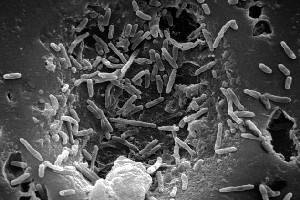Mycobacterium bovis: Difference between revisions
| Line 5: | Line 5: | ||
Photo Courtesy of CDC | Photo Courtesy of CDC | ||
===Higher order taxa=== | ===Higher order taxa=== | ||
Bacteria; Actinobacteria; Actinobacteridae; Actinomycetales; Corynebacterineae; Mycobacteriaceae; Mycobacterium; Mycobacterium tuberculosis complex (1) | "Bacteria; Actinobacteria; Actinobacteridae; Actinomycetales; Corynebacterineae; Mycobacteriaceae; Mycobacterium; Mycobacterium tuberculosis complex" (1) | ||
===Genus=== | ===Genus=== | ||
Revision as of 04:15, 3 June 2007
A Microbial Biorealm page on the genus Mycobacterium bovis
Classification
Higher order taxa
"Bacteria; Actinobacteria; Actinobacteridae; Actinomycetales; Corynebacterineae; Mycobacteriaceae; Mycobacterium; Mycobacterium tuberculosis complex" (1)
Genus
Mycobacterium bovis
|
NCBI: Taxonomy |
Description and significance
“Mycobacterium bovis is the causative agent of tuberculosis in a range of animal species and man, with world wide annual losses to agriculture of $3 billion.”(2) M. bovis is the agent responsible for bovine tuberculosis, however it can also cause the disease in humans if there is consumption of infected materials.(1) Pasteurization of milk has been a major preventative factor in stopping transmission of bovine tuberculosis in humans; however in many underdeveloped countries, where pasteurization is not practiced, there is still a concern with infection by M. bovis.(1) M. bovis AF2122/97 is a fully virulent strain that was isolated from a diseased cow in 1997.(2)
Genome structure
The M. bovis genome sequence is 4,345,492 base pairs in length, arranged in a single circular chromosomes.(2) The genome contains 3,952 genes encoding proteins.(2) The genome is >99.52% identical at the nucleotide level to Mycobacterium tuberculosis.(2) Comparative sequencing with M. tuberculosis revealed 11 deletions from the genome of M. bovis, ranging in size from 1-12.7 kb, and have been confirmed by the genome sequence data.(2) M. bovis contains one unique locus termed TbD1, which is absent from the M. tuberculosis strain; therefore, it would seem that deletion has been the mechanism in shaping the M. bovis genome.(2)
Cell structure and metabolism
M. bovis is similar in structure and metabolism to M. tuberculosis. M. bovis is a Gram-positive, acid-fast, rod-shaped, aerobic bacteria.(1) Unlike M. tuberculosis, M. bovis lacks pyruvate kinase activity, due to pykA containing a point mutation that affects binding of Mg2+ cofactor.(2) Pyruvate kinase catalyses the final step of glycolysis, the dephosphorylation of phosphorenolpyruvate to pyruvate.(2) Therefore in M. bovis glycolytic intermediates are unable to enter into oxidative metabolism.(2) Although no specific studies have been performed, it seems that M. bovis must rely on amino acids or fatty acids as an alternative carbon source for energy metabolism.(2)
Ecology
M. bovis has been able to infect a variety of animals including cows, badgers, buffalo, and lions.(2) An incident at Kruger National Park, caused a massive infection affecting several species of animals.(2) This outbreak has severe implications for the biodiversity of this region.(2)
Pathology
M. bovis is host-associated bacteria.(1) The pathology is similar to M. tuberculosis in humans, with pulmonary tuberculosis leading to chronic debilitation, coughing and further systemic spread to other organs.(1) In the cow which M. bovis AF2122/97 was isolated, the cow was suffering from necrotic lesions in lung and bronchomediastinal lymph nodes.(2) Additionally, infected cows produce mycobacterial mastitis that result in shedding of the bacteria into milk causing transmission to humans if the milk is ingested without pasteurization.(1)
Application to Biotechnology
M. bovis is the progenitor of the only current vaccine against tuberculosis, M. bovis bacillus Calmette-Guérin.(2)
Current Research
Enter summaries of the most recent research here--at least three required
References
(1) http://www.ncbi.nlm.nih.gov/entrez/query.fcgi?db=genomeprj&cmd=Retrieve&dopt=Overview&list_uids=89
(2) Thierry Garnier, Karin Eiglmeier, Jean-Christophe Camus, Nadine Medina, Huma Mansoor, Melinda Pryor, Stephanie Duthoy, Sophie Grondin, Celine Lacroix, Christel Monsempe, Sylvie Simon, Barbara Harris, Rebecca Atkin, Jon Doggett, Rebecca Mayes§, Lisa Keating, Paul R. Wheeler, Julian Parkhill, Bart G. Barrell, Stewart T. Cole, Stephen V. Gordon, and R. Glyn Hewinson. 2003. “The complete genome sequence of Mycobacterium bovis”. Proceedings of the National Academy of Sciences, vol. 100, no.13, (7877-7882)
Edited by Steven Lada, student of Rachel Larsen and Kit Pogliano

